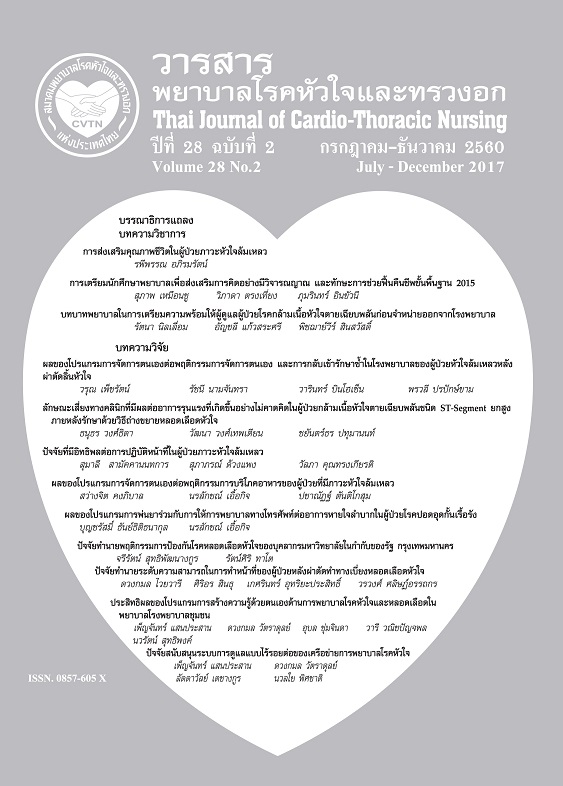ปัจจัยทำนายระดับความสามารถในการทำหน้าที่ของผู้ป่วยหลังผ่าตัดทำทางเบี่ยงหลอดเลือดหัวใจ = Factors predicting functional status in patients coronary artery bypass graft
Keywords:
ผ่าตัดทำทางเบี่ยงหลอดเลือดหัวใจ, ระดับความสามารถในการทำหน้าที่, ความเหนื่อยล้า, patient post coronary artery bypass graft, functional status, fatigueAbstract
การวิจัยนี้มีวัตถุประสงค์ เพื่อศึกษาปัจจัยการทำนายระหว่างเพศ อายุ โรคร่วม ค่าการบีบตัวของหัวใจ การรับรู้การสนับสนุนทางสังคม การใช้เครื่องหัวใจ-ปอดเทียม ภาวะซึมเศร้า ความเหนื่อยล้า และภาวะแทรกซ้อนหลังผ่าตัด ต่อระดับความสามารถในการทำหน้าที่ของผู้ป่วยหลังผ่าตัดทำทางเบี่ยงหลอดเลือดหัวใจเมื่อมาตรวจตามนัดครั้งที่ 2 กลุ่มประชากรคือ ผู้ที่เข้ารับการผ่าตัดทำทางเบี่ยงหลอดเลือดหัวใจเป็นครั้งแรกและมาตรวจตามนัดครั้งที่ 2 จำนวน 106 ราย ด้วยการสุ่มอย่างง่าย เก็บข้อมูลโดยใช้แบบบันทึกข้อมูลส่วนบุคคล แบบบันทึกข้อมูลเกี่ยวกับการเจ็บป่วยและการรักษา แบบประเมินภาวะซึมเศร้า แบบสอบถามการรับรู้การสนับสนุนทางสังคม แบบประเมินความเหนื่อยล้า แบบประเมินโรคร่วม และแบบประเมินระดับความสามารถในการทำหน้าที่ วิเคราะห์ข้อมูลโดยใช้สถิติถดถอยเชิงพหุคูณแบบเข้าพร้อมกัน
การศึกษาพบว่ากลุ่มตัวอย่างมีระดับความสามารถในการทำหน้าที่เมื่อมาตรวจตามนัดครั้งที่ 2 ดีขึ้นเมื่อเทียบกับก่อนผ่าตัด ตัวแปรทั้งหมดสามารถร่วมกันทำนายระดับความสามารถในการทำหน้าที่หลังผ่าตัดเมื่อมาตรวจตามนัดครั้งที่ 2 ได้ร้อยละ 17.7 มีเพียงตัวแปร ค่าการบีบตัวของหัวใจ(β = -.227, p = .022) และความเหนื่อยล้า (β = -.214, p = .033) ที่สามารถทำนายระดับความสามารถในการทำหน้าที่เมื่อมาตรวจตามนัดครั้งที่ 2 อย่างมีนัยสำคัญทางสถิติ
การศึกษานี้มีข้อเสนอแนะว่า ควรมีการจัดกลุ่มบริการการดูแลต่อเนื่องในผู้ป่วยที่มีค่าการบีบตัวของหัวใจต่ำ และคำนึงถึงอาการเหนื่อยล้าที่เกิดขึ้นในระยะหลังผ่าตัด เพื่อให้ผู้ป่วยมีการฟื้นตัวทางด้านระดับความสามารถในการทำหน้าที่ได้อย่างเหมาะสม
Factors predicting functional status in patients coronary artery bypass graft
The present study aimed to investigate the predictive power of sex, age, co-morbidity, ejection fraction, perceived social support, cardiopulmonary bypass, depression, fatigue, and postoperative complications to predict functional recovery in patients underwent coronary artery bypass graft (CABG) at the second postoperatively. The study sample consisted of 106 patients underwent CABG for the first time and having the second appointment at a tertiary hospital. Data were collected using a demographic characteristics questionnaire, an illness and treatment questionnaire, the Center for Epidemiological Studies Depression Scale (CES-D), the Revised-Multi-Dimension Scale of Perceived Social Support (rMSPSS), the Piper Fatigue Scale, the Charlson Comorbidity Index and the Sickness Impact Profile (SIP). Data were analyzed using descriptive statistics, and multiple regression analysis.
The findings revealed that all variables could co-predict functional recovery in patients underwent CABG at the second appointment by 17.7% with statistical significance (p = 0.037). However, the variables that could predict the levels of functional recovery at the second appointment were ejection fraction (β = -0.227, p = 0.022) and fatigue (β = -0.214, p = 0.033).
Based on the study findings, it is recommended that service provision should continue in patients with a low ejection fraction rate. Also, the patients’ postoperative fatigue should be taken into careful consideration to ensure appropriate functional recovery in patients undergoing CABG.
Downloads
Published
How to Cite
Issue
Section
License
บทความนี้ยังไม่เคยตีพิมพ์หรืออยู่ในระหว่างส่งไปตีพิมพ์ในวารสารอื่น ๆ มาก่อน และกองบรรณาธิการขอสงวนสิทธิ์ในการตรวจทาน และแก้ไขต้นฉบับตามเกณฑ์ของวารสาร ในกรณีที่เรื่องของท่านได้ได้รับการตีพิมพ์ในวารสารฉบับนี้ถือว่าเป็น ลิขสิทธิ์ของวารสารพยาบาลโรคหัวใจและทรวงอก






